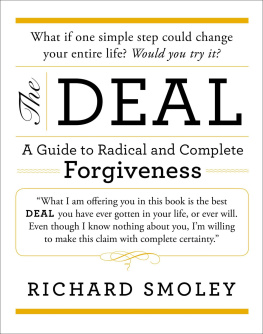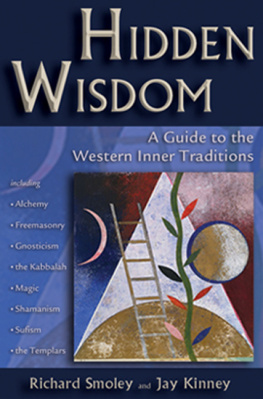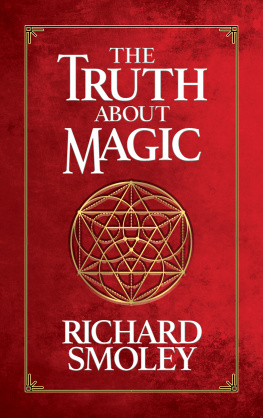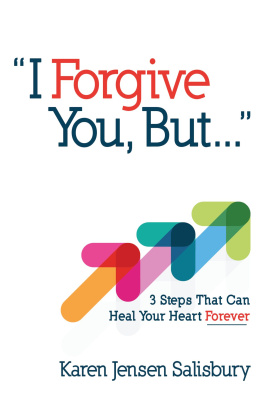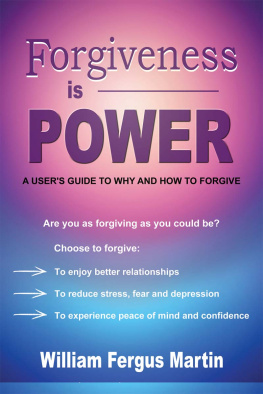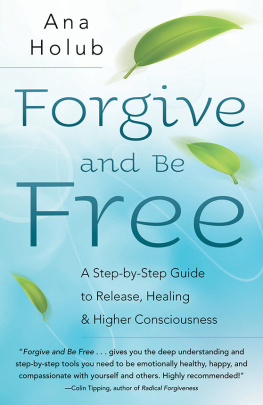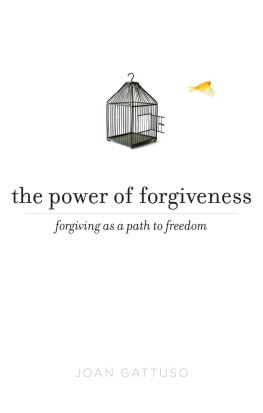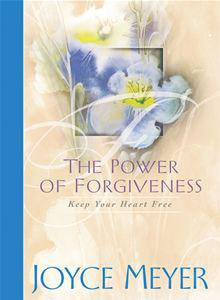What you think youre getting out of your resentments, and why youre not getting anything at all.
A step-by-step guide to releasing all your hostilities.
... and why only complete forgiveness works.
How to keep the Deal going and make it a permanent part of your life.
Answers to some of the most common issues that come up.
A look at the great mystery at the heart of the worlds spiritual traditions.
How to help others keep the Deal aliveand have them help you do the same.
Taking forgiveness into your future.
THE PROBLEM
L et me begin with a confession. My sales skills are extremely limited. Ive never mastered the art of the pitch or the close. My forays into the sales world have amounted to selling advertising for my college literary magazine (admittedly a hard task for anyone) and to a microcareer as a financial adviser, which mostly consisted of futile telemarketing.
So its very much out of character for me to say what I am about to say. What I am offering you in this book is the best deal you have ever gotten in your life, or ever will. Even though I know nothing about you, Im willing to make this claim with complete certainty. There are no products to buy, and theres nothing for you to spend money on. Very little time and effort are required, and you dont have to make any public statements or testimoniesbecause there is also nothing to sell. In fact, you never need tell anyone that you have even done it. All the same, its the best deal that anyone will offer to you at any time in your life, past or present or future. For obvious reasons, I will simply call it the Deal.
The Deal is this: You agree to give up all your grievances and resentments and grudges for good. In exchange, you ask forand receivecomplete forgiveness for yourself.
Broken Glasses
Forgiveness is, we all agree, a great virtue, and we never seem to cease hearing its praises sung. But all is not quite what it seems with this business of forgiveness.
What, after all, do you think when you hear the words I forgive you? Maybe it sends a warm glow through you, but maybe it doesnt. You may remember times when someone said it condescendinglyas if they had the lordly power to bestow it as a favor on mere mortals like you. Possibly you can even remember times when youve said it that way yourself.
Then there is the breast-beating form of forgivenessI forgive you because we are all wretched scum. All have sinned. There is none righteous, no, not one. This hardly feels any better.
In fact, forgiveness seems to be best when its the least ostentatious. If you look back on your life, you may find times when you have forgiven or been forgiven almost without noticing it at all. Im reminded of a time when I was about ten. It was recess at school, and it was winter. Several of us were sliding on the ice. At one point I bumped into another kid by accident. He fell down, and the stem of his eyeglasses broke. I think I said I was sorry, but I really dont remember. One of the other kids said, Wow! Youre going to have to pay for those! The kid whose glasses were broken didnt say anything.
I was very anxious for the rest of the day and night. I was sure that my parents would have to pay for the glasses, and, having no idea of how much they cost, I was terrified that the price would be stiff. Of course I said nothing. The next day I went to school dreading the consequences of my deeds. What greeted me was something I did not expect in the slightest. The kid with the broken glasses had a little bit of tape wrapped around the broken stem, and the glasses seemed to be holding together. He still didnt say anything, and I never worried about the problem again.
Was that forgiveness? It certainly wasnt forgiveness of any grandiose sort. It was simply a matter of letting the whole thing go. All the same, it was a tremendous relief to me, and I was grateful enough to remember the incident almost fifty years later.
From all of this, it seems clear that forgiveness can take more than one form. It can be, and often is, a simple matter of letting things drop. It need not involve blubbery reconciliations and lots of hugging. Of course those can happen too, and they can be intense and satisfying in their own way. But forgiveness is far richer and more wide-ranging than even the most intense emotional experience.
The Pleasures of Resentment
It seems that forgiveness in any form feels good. So if it feels good, why dont we do it more often?
Partly because it can also feel good not to forgive. There can be something delicious in holding a grievance, in mulling over someone elses wrongs and failings and viewing him through the lenses of condemnation. We could call this the thrill of righteousness. In 1964, psychologist Eric Berne published a best seller called Games People Play. One of these games was called Now Ive Got You, You Son of a Bitch. As Berne put it, This can be seen in classic form in poker games. White gets an unbeatable hand, such as four aces. At this point, if he is a NIGYSOB player, he is more interested in the fact that Black is at his complete mercy than he is in good poker or making money. Possibly the thrill of righteousness has something to do with this game.
Unfortunately, righteousness is the most dangerous of all weapons to wield. Its easily turned against the user. Say one of your fellow employees is regularly late for work. You find it delicious to contemplate this poor fools tardiness and to congratulate yourself for your own punctuality. Then one day, for some reason or another, you are late for work yourself. The boss yells at you in front of everybody, including the coworker who youve been so comfortably despising. Suddenly all the fun has gone sour. The moral might be this: Beware the sin you condemn. It will be the next one that you commit.

